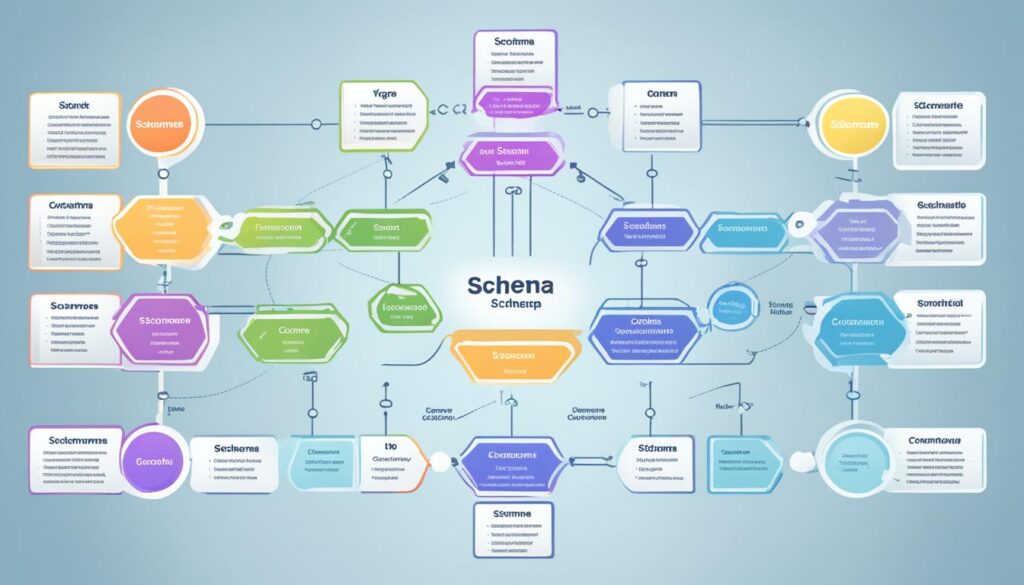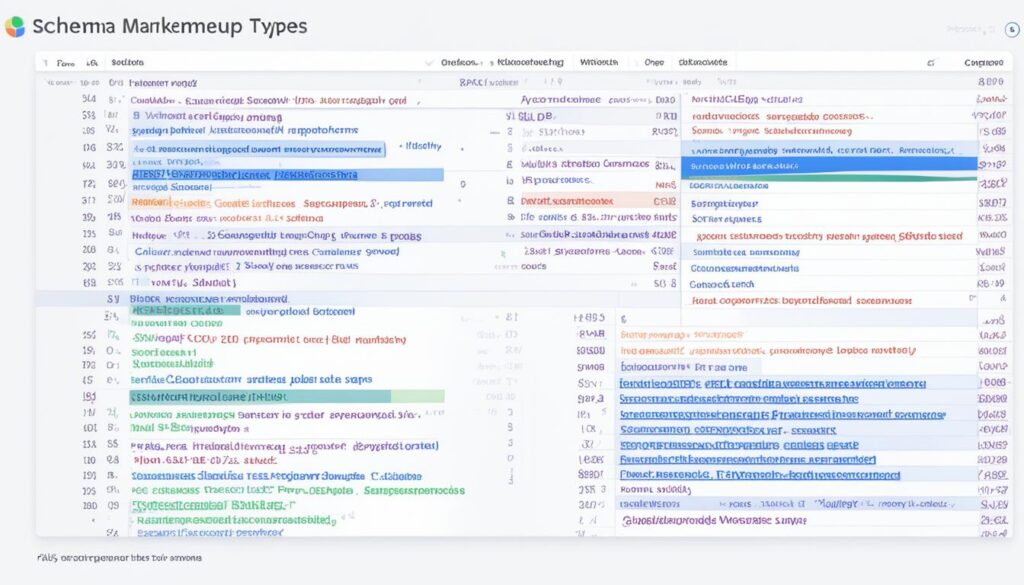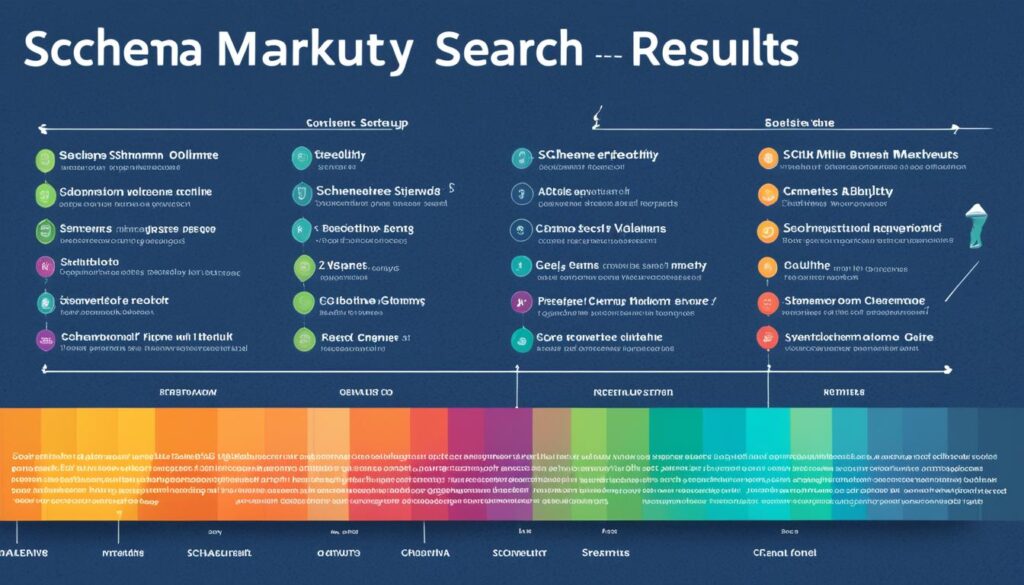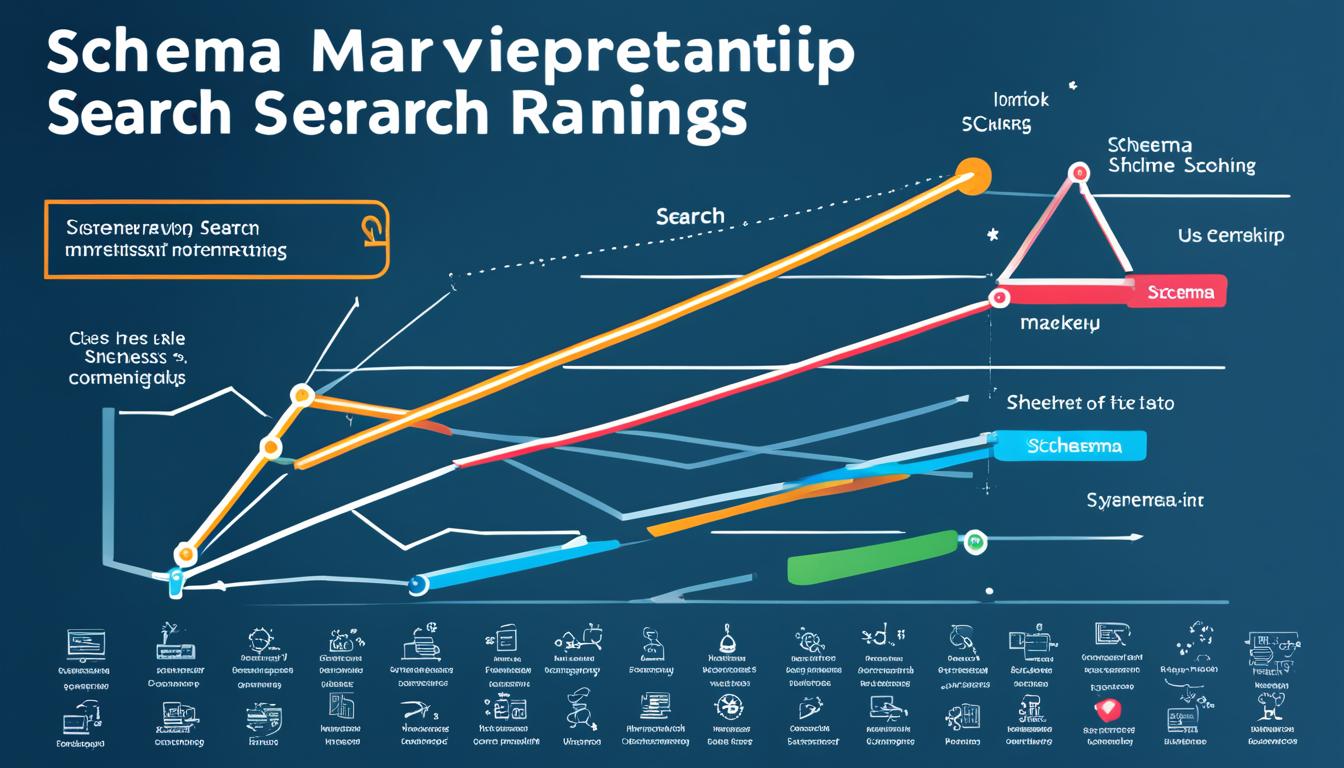Ever wondered why some websites are more visible in search results than others? The answer might be in a powerful tool called schema markup. This technique changes how search engines see web content. Yet, surprisingly, only 6% of pages on Google’s first page use it1.
Schema markup acts like a secret language between your site and search engines. It helps search engines understand your content better. This leads to rich snippets, better click-through rates, and higher rankings. In fact, pages with schema markup get a 40% higher click-through rate than those without it1.
By using schema markup, we’re not just making our site more visible. We’re also boosting our online reputation. It helps us stand out in search results, give users more relevant info, and drive more traffic to our site2.
Let’s explore schema markup and see how it can change our online presence. From better search rankings to attracting local customers, schema markup is a key SEO tool3.
Key Takeaways
- Schema markup significantly improves click-through rates
- Only a small percentage of websites currently use schema markup
- Implementing schema markup can lead to rich snippets in search results
- Schema markup enhances search engine understanding of website content
- Various types of schema markup exist for different industries and content types
- Schema markup can boost local business visibility in search results
Understanding Schema Markup and Its Importance
Schema markup is a key tool for making web content clearer to search engines. It started in 2011 with big names like Google, Yahoo, Bing, and Yandex working together. Now, schema.org is the top choice for structured data45. This semantic vocabulary helps search engines understand website parts better, making indexing and search results better.
There are 792 schema types available, covering things like creative works, events, and products5. Using schema markup lets websites talk better with search engines. This could lead to more organic traffic and being more visible in search results.
Schema markup isn’t a direct ranking factor, but it’s key for rich snippets on search pages4. These rich snippets can increase clicks and lower bounce rates by giving users more info about the page5.
“Schema markup is the secret ingredient that helps search engines serve up rich results, giving users a taste of your content before they even click.”
Google suggests using JSON-LD for structured data because it’s easy to add and keep up with4. JSON-LD, along with microdata and RDFa, helps websites give context and clear up entities. This makes search engines understand content better and could help with search rankings.
| Schema Markup Benefits | Impact on Search Visibility |
|---|---|
| Enhanced rich snippets | Increased click-through rates |
| Improved voice search optimization | Better visibility in voice search results |
| Disambiguated entities | Increased relevance for non-branded queries |
| Structured data consistency | Improved search engine understanding |
Using schema markup can open doors for rich results, voice search optimization, and more organic traffic. As search engines keep getting better, using structured data for different objects can help websites stay ahead in a tough online world.
Types of Schema Markup for Enhanced Visibility
Schema markup is key to boosting our online visibility. By using different schema types, we can greatly improve our search engine rankings and user experience. Let’s look at some important schema types that can make our web presence better.

Organization schema shares important info about businesses, like contact details and social media links. This markup helps search engines get our company structure and boosts our online presence6.
For local businesses, local business schema is a big win. It helps us show up in local search results and Google Maps. This is key for showing our address, phone number, and hours6.
E-commerce sites gain a lot from product schema. This markup adds details like pricing, availability, and ratings to our product listings. This makes our products stand out in search results6.
Other key schema types include:
- Article schema for blog posts
- Event schema for upcoming events
- Review schema for customer feedback
- Recipe schema for cooking content
Using these schema types can increase click-through rates. This is because of attractive SERP features and better visibility in search results67.
| Schema Type | Benefits |
|---|---|
| Local Business | Improved local search visibility |
| Product | Enhanced e-commerce listings |
| Review | Increased credibility |
| Event | Better event visibility in SERPs |
By using these schema types well, we can make our online visibility better. We also give users more relevant and detailed info right in search results.
Implementing Schema Markup: A Step-by-Step Guide
Let’s explore how to add schema markup to boost your website’s visibility. Schema markup is key in technical SEO, helping sites rank better in search engines8.
Start by picking the right schema types for your content from Schema.org. You can choose from Article, Product, Review, Recipe, Event, Organization, and Person9. It’s important to pick the right type to improve your search visibility.

Then, use Google’s Structured Data Markup Helper to make adding schema easier. This tool helps you tag your content with the right schema markup. Search engines need help understanding your content, and structured data gives them clear hints8.
For schema implementation, you have three formats: JSON-LD, microdata, and RDFa. Google suggests using JSON-LD for its ease and effectiveness. After making your markup, put it into your HTML code.
Testing is key. Use validation tools to check your markup is right and works well. Keeping up with updates is important to follow search engine rules and stay effective10.
“Schema markup can increase click-through rates by up to 30% by providing more detailed information in search results.”
By using schema markup, you’re not just making your site more visible. You’re also building trust, optimizing for voice search, and possibly getting more traffic and customer interaction10. Don’t miss these chances to stand out in search results and get more clicks.
Schema Markup for Enhanced Visibility: Best Practices
Using schema markup right can make your content stand out in search results. We’ll look at the best ways to use schema effectively.
Choosing the right schema is key to making your content more visible. Pick schema types that match what’s on your webpage. For instance, use product schema for online stores or event schema for event pages11.
It’s important to have accurate information in your schema. Make sure all data is current and matches what’s on your page. This helps search engines understand and trust your content more12.

Keeping your schema up-to-date is crucial. Check and update it regularly to match any changes in your content or site. This keeps your rich results fresh and relevant12.
Being mobile-friendly is a must in today’s digital world. Make sure your schema works well on mobile devices. This makes for a better user experience everywhere.
Checking your schema for errors is a must. Use tools like Google’s Rich Results Test to make sure it’s correct. This helps spot and fix mistakes before they affect your search visibility12.
Using different schema types can help you show up in more search features. For example, combining product and review schemas can make your product pages look better in search results11.
| Schema Type | Potential Benefit | Best Practice |
|---|---|---|
| Product | Enhanced product listings | Include price, availability, and ratings |
| Recipe | Rich recipe cards | Add cooking time, ingredients, and nutrition info |
| Event | Event snippets in search | Specify date, time, and location details |
| Article | News carousel features | Include author, publish date, and headline |
By following these best practices, you can help search engines understand your content better. This can increase your website’s visibility in search results. Remember, schema markup is an ongoing process that needs regular attention for the best results13.
Measuring the Impact of Schema Markup on Search Visibility
It’s key to track how schema markup affects our search visibility. We use Google Search Console to watch important metrics like click-through rates and organic traffic. This tool gives us insights into how well rich results perform, showing us the effect of schema14.
Schema markup can greatly increase click-through rates for searches about buying things. Some types of items see better results in just three weeks after adding schema15. For online stores, using different schema types can lead to more search results in a week. This means more people click and better rankings in about 90 days15.

Using schema markup for entities, like the Thing type with About and Mentions, can increase views for tough search terms after 6 weeks. Rankings get better around 120 days later15. This slow rise in rankings comes from people engaging more with richer search results.
Schema markup helps search engines understand website content better, leading to higher click-through rates and improved organic traffic.
We check how well schema markup works with tools like Google’s Rich Results Test and the Structured Data Testing Tool. These tools make sure our schema is right and follows the rules16. Keeping an eye on search rankings and schema analytics lets us make our strategy better for more visibility.
| Metric | Impact of Schema Markup | Timeframe |
|---|---|---|
| Click-through rates | Significant improvement | 3-6 weeks |
| Search appearances | Noticeable increase | 1 week |
| Ranking improvements | Evident change | 90-120 days |
Conclusion
We’ve looked into how schema markup can boost online visibility and improve SEO. By using structured data, websites can move up four spots in search results. This gives them a big advantage over others17. This means more people will see them, leading to more clicks and more visitors18.
Schema markup is also great for local businesses. It lets them share details like their address, phone number, and hours. This makes it easier for people to find and connect with them on Google Maps and in local search results19.
In conclusion, schema markup is key for any digital marketing plan. Google supports 32 types of schema, from articles to ratings, offering many ways to boost your online presence17. Adding schema markup in your website’s HTML head is a smart move for search engines18. Using tools like Google’s Structured Data Testing Tool helps make sure our efforts pay off.
FAQ
What is schema markup?
Why is schema markup important for SEO?
What are some common types of schema markup?
How do I implement schema markup on my website?
What are some best practices for schema markup implementation?
How can I measure the impact of schema markup on my website’s search visibility?
Why is schema markup important for online reputation management?
Source Links
- How to Master Schema Markup for Better SEO Performance – https://www.singlegrain.com/blog/x/schema-markup/
- Implement Schema Markup to Enhance Search Engine Visibility – The ICT Shak – Brisbane Web Solutions – https://www.theictshak.com.au/blog/implement-schema-markup-to-enhance-search-engine-visibility
- How to Use Schema Markup to Enhance Your SEO – https://aicontentfy.com/en/blog/how-to-use-schema-markup-to-enhance-seo
- What Is Schema Markup & Why Is It Important For SEO? – https://www.searchenginejournal.com/technical-seo/schema/
- What is Schema Markup and how do you implement it? – https://umbraco.com/knowledge-base/schema-markup/
- Advanced Schema Markup for Enhanced SERP Features – https://www.linkedin.com/pulse/advanced-schema-markup-enhanced-serp-features-sina-abbasi-zuhhf
- The Power of Schema Markup for SEO: A Comprehensive Guide – https://blog.thatagency.com/the-power-of-schema-markup-for-seo
- A Step-by-Step Guide to Implementing Schema Markup – https://medium.com/@ivector229/a-step-by-step-guide-to-implementing-schema-markup-83de0b27a193
- Schema Markup Demystified: A Step-by-Step Guide to Implementing Schema Markup – E-Web Marketing – https://www.ewebmarketing.au/schema-markup-demystified-a-step-by-step-guide-to-implementing-schema-markup/
- Complete Guide to Schema Markup SEO | Content Whale – https://content-whale.com/blog/schema-markup-seo-guide/
- Structured Data and Schema Markup: The Complete Guide – https://marketbrew.ai/structured-data-and-schema-markup-the-complete-guide
- Schema Markup 101: Benefits and Best Practices – The Publisher Desk – https://www.publisherdesk.com/schema-markup-101-benefits-best-practices/
- 2024 SEO Essential: Your Complete Guide to Schema Markup – https://makewebbetter.com/blog/schema-markup-seo-best-practices/
- Testing the Impact of Schema Markup for SEO – https://www.searchpilot.com/resources/case-studies/testing-schema-markup
- How Schema Affects Rankings in Google: Is Markup a Ranking Factor? – https://wordlift.io/blog/en/how-schema-affects-rankings-in-google/
- Mastering Structured Data in SEO: A Beginner’s Guide – Hike SEO – https://hikeseo.co/learn/onsite/technical/structured-data/
- How to Effectively Use Schema Markup for Better Search Visibility – https://brentonway.com/schema-markup-for-search-visibility/
- Schema Markup Benefits and Why It Matters for SEO Success – https://www.mastroke.com/blog/digital-marketing/schema-markup-and-its-many-seo-benefits/
- Why Is Schema Important for Your Website’s SEO? – https://www.pageoptimizer.pro/blog/why-is-schema-important-for-your-websites-seo

